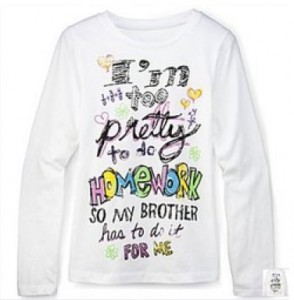“Have you been playing with her?” I asked my four-year-old one night as she was settled in for bed. One of her favorite friends had been away for 6 weeks over the holidays and though she’d since been back a few weeks, it suddenly dawned on me that I hadn’t heard her name come up as we talked about her days at school. So I asked if they’d been playing.
Turns out, if you ask a preschooler the right questions, sometimes you just might get a detailed answer. Even if you don’t like the answer you will get.
“No. I haven’t been playing with her,” she responded.
“Why not?” I asked.
“Because I don’t play with people with brown skin.”
I just about choked on my own saliva as I processed this statement. Quickly I assured myself that this child is barely four-years-old and by no means is she a card-carrying member of the KKK but this was still deeply troublesome to me.
I prodded her on who told her this and why she was saying it and learned she’d heard it from another child in her class.
 Obviously we have a long road in front of us, we being me and Mr. Wired Momma, in terms of the kinds of whacky and hurtful things our children are bound to say to each other and about others – not to mention things that are going to be said to them – and if I’m struggling with this with a four-year-old – then one wonders how equipped I am for the murky and fraught teen years.
Obviously we have a long road in front of us, we being me and Mr. Wired Momma, in terms of the kinds of whacky and hurtful things our children are bound to say to each other and about others – not to mention things that are going to be said to them – and if I’m struggling with this with a four-year-old – then one wonders how equipped I am for the murky and fraught teen years.
In the instance of my daughter, she was isolating one girl at school based on her skin color because some other kid at school told her to do it. Why would she listen to this other kid, I worried. In our extremely liberal community, I never once believed this particular child was hearing these statements at home but I really couldn’t get past why she would listen to this kid.
#BecauseSheis4…..
The reality is, it wasn’t that she listened to this kid that mattered as much as this: teaching her that we actually DO play with people with different skin colors and that our words hurt others. Of course, I thought I’d already been doing that but apparently not enough.
The bottom line is – whether we are talking about preschoolers or teenagers – bullying and hateful comments are not just about the kids – they are about the parents. We know that bullying, mean girls and cyber-bullying is a problem that isn’t going away. The question is – do we put enough onus on ourselves as parents when we discuss these issues? Are we involved enough? Do we ask enough questions?
We hover hover hover over our kids as babies. We help them up the slides, we help them down the slides. We make their own food from scratch. We worry about how long we nurse them for. We fret over when they are old enough to walk home alone from the bus stop. We eliminate all BPA. We buy organic. We fret and worry.
Meanwhile, do we far too easily hand them a cell phone, an iPad, or access to the internet? Do we allow them to get on Twitter, to establish Facebook accounts or Instagram accounts far too young? Do we, ourselves, as parents, understand the pitfalls, dangers and repercussions of this carte blanche to the vast world of the Internet? Are we equipped to teach them of the great responsibility in the freedom of the internet? Do we appreciate the dangers in our kids having Instagram accounts and posting pictures, in real-time, for anyone to see not just who they are but where they are? Do we “friend” them on Facebook? Are we aware of what they are posting on Twitter? Have we set the parental controls on Google so they can’t stumble upon anything in a search?
Are we prepared to invest the amount of time it takes to monitor and guide other them to help make sure they are responsible cyber-citizens?
Do we hyper-parent when they are extremely young and then slack off too much when they get a little older? What is the right line between encouraging independence, setting them free, and also remembering they are still teens without the best judgement all the time – and with tremendous access to say and explore and be seen – thanks to technology?
I’m not sure if you’ve seen it but Emily Bazelon has a fascinating piece in The Atlantic about cyber-bullying. Near the end of her long and provocative piece, she notes this: “I find myself agreeing with Ash that “someone needs to teach these kids to be mindful, and anyone doing that is a good thing.”
I wonder how much this particular point, the role of the parents, gets blurred because we are so distracted with the fact that kids are destroying each other in social media. And for some recent examples of just how brutally teens are destroying each other in social media, be sure to read Bazelon’s piece in the Atlantic. It is bound to leave you feeling uneasy.
What intrigued me about her piece, beyond her insight that middle and high school age kids would rather be suspended from school than kicked off Facebook, was Bazelon’s interview with MIT professor, Henry Lieberman. Professor Lieberman discovered that bullies, shockingly, aren’t that “creative” in their techniques and their bullying tends to fall overwhelmingly into six categories: appearance, intelligence, race, ethnicity, sexuality, or social acceptance and rejections. He then created an algorithm that can detect tone and combinations of words to determine bullying or mean language. The program he built will then prompt you before you post something potentially hurtful and note that it seems mean and ask if that’s what you meant to say, or ask if you’d like to wait 60 minutes before posting this.
Honestly, I could benefit from this program on some days. And lord knows some of the adults who so easily hurl insults at one another on the neigborhood listservs I am on could certainly benefit from a prompt asking them if they really want to be that mean or maybe want to sit on that message for a bit before pressing send. So this must be a brilliant idea for teens, right?
Hmmm.
Well, in my head, if one of my girls were about to be really mean online and a program prompted them to ask if they really wanted to do that, it would stop them dead in their tracks.
Then again, in my head, my four-year old doesn’t make racist statements either, so perhaps reality is a little different?
Here’s a quick link to a 2-minute video about Professor Lieberman’s computer program – it’s super interesting.
So where does that leave us? It leaves me thinking about the group Anonymous that Bazelon describes in her article because a few members of the group, which is primarily a group of hackers, took on some cyber-bullies in Twitter and brought it to the attention of the local school district and police. If a group of online hackers is doing this – to take down bullies – then again, where are the parents?
Busy hovering over their toddler on the playground?
Look – I don’t have any answers and I don’t have a teen yet – so I’m aware of how easy it is to over-simplify and point fingers when you aren’t there yet – but are we being honest with ourselves as parents? Are we engaging enough in the murky areas of social media if we’re giving our kids the keys and the access?
Here are some great tips for parents from The Bullying Project. You can learn more about The Bully Effect and the movie here
“Like” my page on Facebook to keep up with all the discussions and topics.








